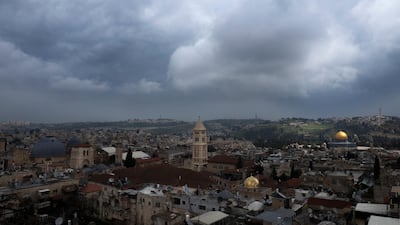The body that oversees the Haram Al Sharif compound has called for an end to “incursions” by settlers at the sensitive site in occupied East Jerusalem.
More than 300 Israeli settlers entered the site under police protection on Sunday, performing religious rituals.
The settlers entered through the Dung Gate, which leads to the Western Wall Plaza inside the Old City of Jerusalem, according to the Palestinians.
Undersecretary of the Palestinian Waqfs and Religious Affairs Ministry Husam Abu Al Rob called on the international community to act against the inflammatory visits.
"Jerusalem will remain Islamic and the occupation will not deprive it of its identity no matter what it does," Mr Abu Al Rob said in a statement.
Egypt’s Al Azhar Mosque also condemned the intrusions.
"Al-Azhar stresses that the Arab identity of Al-Quds is not a matter to be messed with," said the world's leading Sunni Islamic institution, adding that “international Zionist schemes” to erase the Arab identity of the contested city will fail.
The site is the third-holiest in Islam. Jews revere the site but cannot pray there. A Jordanian-Palestinian waqf, or Islamic trust, maintains control of it.
The closest Jews can pray to the site is at the Western Wall, believed to be the remains of a historical Jewish temple. Some right-wing activists in Israel have called for the destruction of the Al Aqsa Mosque to make way for a third temple at the site. Israel did not overrun the complex following its seizure of East Jerusalem in the Arab-Israeli War in 1967 because of security considerations.
Last week, clashes broke out between Palestinians and Israeli police after ultra-religious Jews were allowed to visit the compound at the end of Ramadan for the first time in decades.
Jordan, the custodian of the compound, slammed the "provocative Israeli policies" after the clashes.

